新闽教版小学英语五年级知识点归纳
- 格式:docx
- 大小:909.77 KB
- 文档页数:12
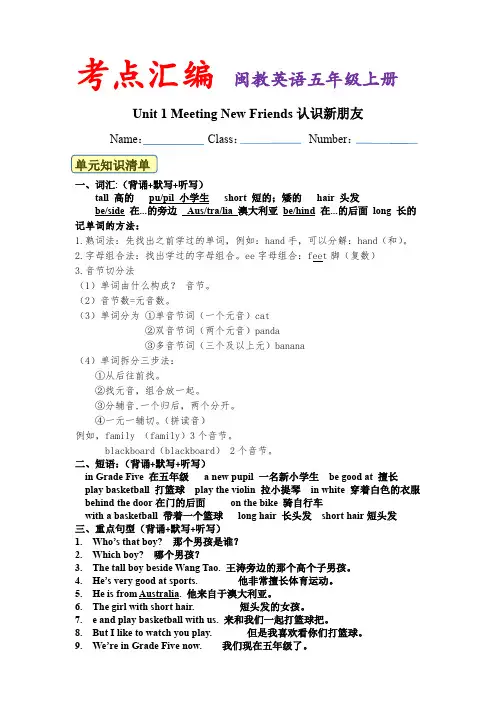
考点汇编闽教英语五年级上册Unit 1 Meeting New Friends认识新朋友Name:Class:Number:一、词汇:(背诵+默写+听写)tall 高的pu/pil 小学生short 短的;矮的hair 头发be/side 在...的旁边Aus/tra/lia 澳大利亚be/hind 在...的后面long 长的记单词的方法:1.熟词法:先找出之前学过的单词,例如:hand手,可以分解:hand(和)。
2.字母组合法:找出学过的字母组合。
ee字母组合:feet脚(复数)3.音节切分法(1)单词由什么构成?音节。
(2)音节数=元音数。
(3)单词分为①单音节词(一个元音)cat②双音节词(两个元音)panda③多音节词(三个及以上元)banana(4)单词拆分三步法:①从后往前找。
②找元音,组合放一起。
③分辅音,一个归后,两个分开。
④一元一辅切。
(拼读音)例如,family (family)3个音节。
blackboard(blackboard) 2个音节。
二、短语:(背诵+默写+听写)in Grade Five 在五年级 a new pupil 一名新小学生be good at 擅长play basketball 打篮球play the violin 拉小提琴in white 穿着白色的衣服behind the door在门的后面on the bike 骑自行车with a basketball 带着一个篮球long hair 长头发short hair短头发三、重点句型(背诵+默写+听写)1. Who’s that boy? 那个男孩是谁?2. Which boy? 哪个男孩?3. The tall boy beside Wang Tao. 王涛旁边的那个高个子男孩。
4. He’s very good at sports. 他非常擅长体育运动。
5. He is from Australia. 他来自于澳大利亚。
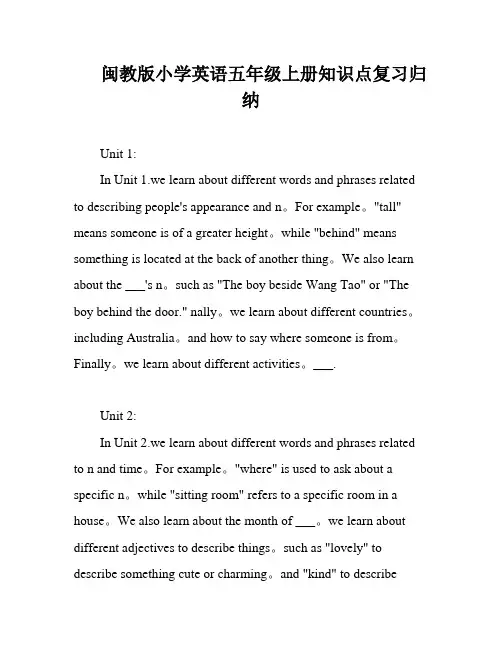
闽教版小学英语五年级上册知识点复习归纳Unit 1:In Unit 1.we learn about different words and phrases related to describing people's appearance and n。
For example。
"tall" means someone is of a greater height。
while "behind" means something is located at the back of another thing。
We also learn about the ___'s n。
such as "The boy beside Wang Tao" or "The boy behind the door." nally。
we learn about different countries。
including Australia。
and how to say where someone is from。
Finally。
we learn about different activities。
___.Unit 2:In Unit 2.we learn about different words and phrases related to n and time。
For example。
"where" is used to ask about a specific n。
while "sitting room" refers to a specific room in a house。
We also learn about the month of ___。
we learn about different adjectives to describe things。
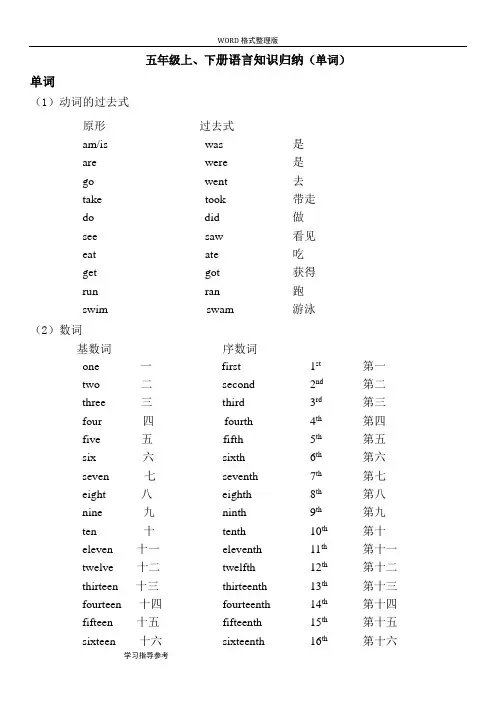
五年级上、下册语言知识归纳(单词)单词(1)动词的过去式原形过去式am/is was 是are were 是go went 去take took 带走do did 做see saw 看见eat ate 吃get got 获得run ran 跑swim swam 游泳(2)数词基数词序数词one 一first 1st第一two 二second 2nd第二three 三third 3rd第三four 四fourth 4th第四five 五fifth 5th第五six 六 sixth 6th第六seven 七 seventh 7th第七eight 八eighth 8th第八nine 九 ninth 9th第九ten 十 tenth 10th第十eleven 十一eleventh 11th第十一twelve 十二 twelfth 12th第十二thirteen 十三thirteenth 13th第十三fourteen 十四 fourteenth 14th第十四fifteen 十五fifteenth 15th第十五sixteen 十六 sixteenth 16th第十六seventeen 十七s eventeenth 17th第十七eighteen 十八eighteenth 18th第十八nineteen 十九nineteenth 19th第十九twenty 二十 twentieth 20th第二十(3)月份January 一月February 二月March 三月April 四月May 五月June 六月July 七月August 八月September 九月October十月November 十一月December 十二月(4)表情的形容词proud 自豪的sad 难过的tired 疲倦的angry 生气的happy 高兴的hungry 饥饿的lucky 幸运的thirsty 渴的(5)名词parent 父,母;家长hometown 故乡lake 湖elephant 大象hill 小山map 地图animal 动物garden 花园water 水camera 照相机sky 天空cloud 云floor 楼层bridge 桥date 日期meter 米race 赛跑river 河Mrs. 夫人,太太drawing 画calendar 日历people 人,人们tour 旅行;旅游mountain 山grass 草program 节日building 建筑物neighbor 邻居flower 花paper 纸glasses 眼镜taxi 出租车mobile 手机phone 照片picture 照片,图画classmate 同班同学panda 熊猫pupil 小学生uncle 叔叔,伯伯month 月份man 男人(6)动词color 上颜色hide 藏climb 攀爬try 尝试drink 喝smile 微笑guess 猜cook 烹调shout 喊叫write写(7)形容词tall 高的short 矮的long hair 长头发short hair 短头发young年轻的lovely 可爱的(8)介词In 在…..里面on在……上面beside 在……旁边Behind 在……后面(9)地点词sitting room 客厅museum 博物馆cinema 电影院train station 火车站hospital 医院City Library 市图书馆bus stop 公交车站(10)其他under 在......下面brown 棕色的fast 快b usy 忙的only 仅仅 also 也difficult 困难的before 在......之前(11)专有名词Sun Moon Lake 日月潭Easter Bunny 复活节兔子Sports Day 运动会China 中国Easter 复活节the Great Wall 长城National Day 国庆节Australia 澳大利亚the USA 美国Teachers’ Day 教师节(12)短语look for 寻找pick up 捡起long jump 跳远high jump 跳高living room 客厅play basketball 打篮球over there 在那边next to 紧挨着get on 上车fall down 跌倒;跌下cheer up 振作起来watch a film 看电影play football 踢足球take a photo 照相draw a picture 画画play chess 下象棋go straight 直着走turn right 向右转turn left 向左转turn on 打开sit down 坐下put on 戴上重点句型1)How was your winter vacation ? 你的寒假过得怎样?It was wonderful. I visited the Great Wall. 太棒了。
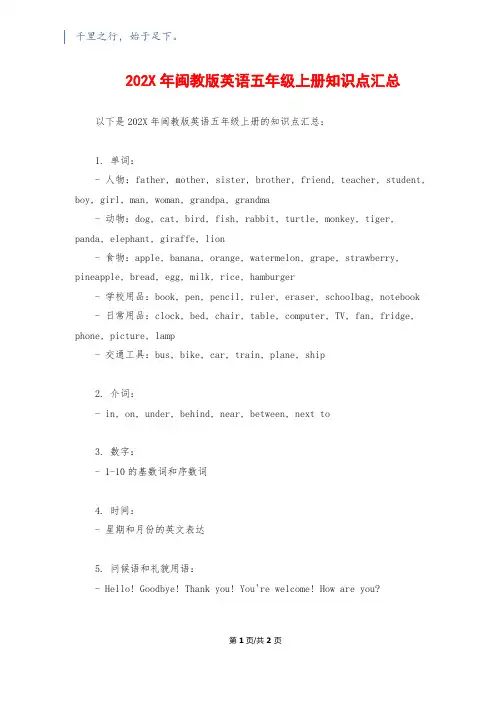
千里之行,始于足下。
202X年闽教版英语五年级上册知识点汇总以下是202X年闽教版英语五年级上册的知识点汇总:1. 单词:- 人物:father, mother, sister, brother, friend, teacher, student, boy, girl, man, woman, grandpa, grandma- 动物:dog, cat, bird, fish, rabbit, turtle, monkey, tiger, panda, elephant, giraffe, lion- 食物:apple, banana, orange, watermelon, grape, strawberry, pineapple, bread, egg, milk, rice, hamburger- 学校用品:book, pen, pencil, ruler, eraser, schoolbag, notebook - 日常用品:clock, bed, chair, table, computer, TV, fan, fridge, phone, picture, lamp- 交通工具:bus, bike, car, train, plane, ship2. 介词:- in, on, under, behind, near, between, next to3. 数字:- 1-10的基数词和序数词4. 时间:- 星期和月份的英文表达5. 问候语和礼貌用语:- Hello! Goodbye! Thank you! You're welcome! How are you?第1页/共2页锲而不舍,金石可镂。
6. 句型:- What's your name? My name is...- How old are you? I'm ... years old.- Where are you from? I'm from...- What's your hobby? My hobby is...- What's this/that? It's a/an...7. 基本语法:- 一般现在时:主语+动词原形- 一般过去时:主语+动词过去式- 介词短语的位置和用法- 物主代词的用法:my, your, his, her, its 注意:以上知识点仅供参考,具体以教材为准。
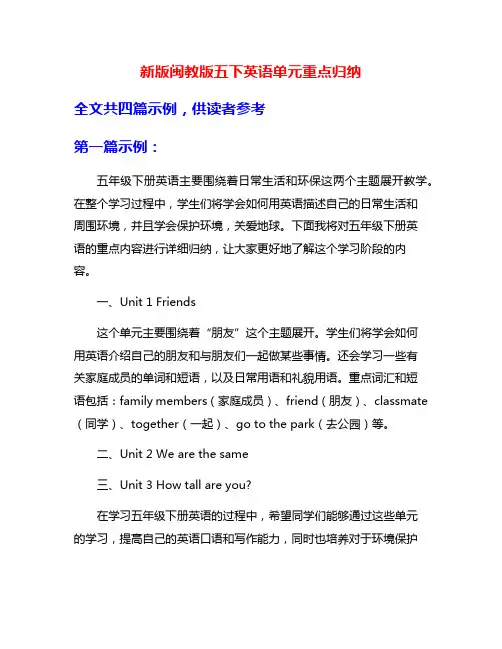
新版闽教版五下英语单元重点归纳全文共四篇示例,供读者参考第一篇示例:五年级下册英语主要围绕着日常生活和环保这两个主题展开教学。
在整个学习过程中,学生们将学会如何用英语描述自己的日常生活和周围环境,并且学会保护环境,关爱地球。
下面我将对五年级下册英语的重点内容进行详细归纳,让大家更好地了解这个学习阶段的内容。
一、Unit 1 Friends这个单元主要围绕着“朋友”这个主题展开。
学生们将学会如何用英语介绍自己的朋友和与朋友们一起做某些事情。
还会学习一些有关家庭成员的单词和短语,以及日常用语和礼貌用语。
重点词汇和短语包括:family members(家庭成员)、friend(朋友)、classmate (同学)、together(一起)、go to the park(去公园)等。
二、Unit 2 We are the same三、Unit 3 How tall are you?在学习五年级下册英语的过程中,希望同学们能够通过这些单元的学习,提高自己的英语口语和写作能力,同时也培养对于环境保护的意识,为建设美丽的地球尽一份力量。
希望大家都能在英语学习的路上越走越顺,不断提升自己的能力,成为优秀的英语学习者!第二篇示例:新版闽教版五下英语单元重点归纳五年级下册是学生英语学习的一个重要阶段,也是一个承上启下的阶段。
在这一阶段,学生们需要巩固和扩展他们在前几年所学到的英语知识,并且学习一些新的知识。
新版闽教版五下英语单元内容丰富多样,涵盖了生活中的各个方面,使学生在学习英语的也能够了解更多有关世界的知识。
第一单元:世界体育运动在这个单元里,学生们将学习到有关体育运动的词汇和句型,向同学们介绍自己喜欢的运动项目,并且了解一些世界知名的体育运动项目,比如篮球、足球和田径等。
在学习这个单元的过程中,学生们能够了解到不同国家的文化和传统,同时也可以锻炼他们的口语表达能力。
第二单元:家庭与亲情这个单元主要围绕家庭与亲情展开,学生们将学习到有关家庭成员的词汇和句型,表达对家人的爱和关心,学会与家人交流和沟通。
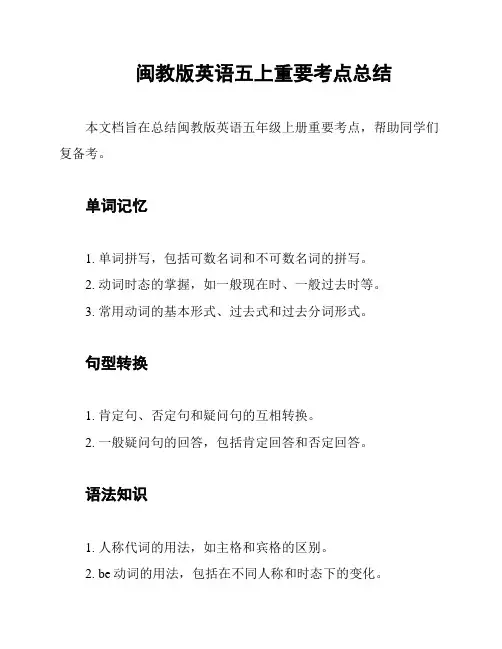
闽教版英语五上重要考点总结
本文档旨在总结闽教版英语五年级上册重要考点,帮助同学们复备考。
单词记忆
1. 单词拼写,包括可数名词和不可数名词的拼写。
2. 动词时态的掌握,如一般现在时、一般过去时等。
3. 常用动词的基本形式、过去式和过去分词形式。
句型转换
1. 肯定句、否定句和疑问句的互相转换。
2. 一般疑问句的回答,包括肯定回答和否定回答。
语法知识
1. 人称代词的用法,如主格和宾格的区别。
2. be动词的用法,包括在不同人称和时态下的变化。
3. 一般现在时的应用场景,如描述经常发生的事情。
4. 一般过去时的应用场景,如过去发生的事件。
阅读理解
1. 抓住关键词,理解文章主旨。
2. 根据语境推测词义。
3. 根据文章内容回答问题,理解细节信息。
4. 根据文章意思,完成相关练。
听力理解
1. 训练听力,提高听懂对话和短文的能力。
2. 根据听到的内容回答问题,理解细节信息。
3. 根据对话和短文的意思,完成相关练。
书面表达
1. 用自己的语言描述图片或短文内容。
2. 根据题目要求进行写作,表达清晰准确。
以上是五年级上册的重要考点总结,同学们在复备考过程中可以参考本文档进行针对性复,提升英语研究水平。
祝同学们考试顺利!
(800字)。
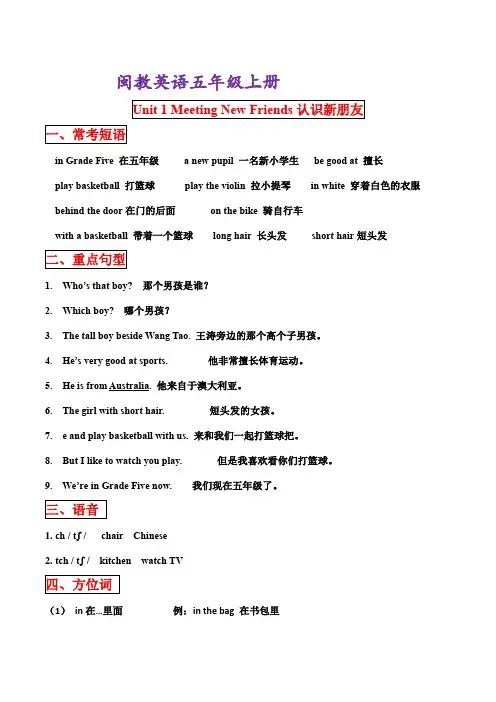
闽教英语五年级上册in Grade Five 在五年级 a new pupil 一名新小学生be good at 擅长play basketball 打篮球play the violin 拉小提琴in white 穿着白色的衣服behind the door在门的后面on the bike 骑自行车with a basketball 带着一个篮球long hair 长头发short hair短头发1. Who’s that boy? 那个男孩是谁?2. Which boy? 哪个男孩?3. The tall boy beside Wang Tao. 王涛旁边的那个高个子男孩。
4. He’s very good at sports. 他非常擅长体育运动。
5. He is from Australia. 他来自于澳大利亚。
6. The girl with short hair. 短头发的女孩。
7. e and play basketball with us. 来和我们一起打篮球把。
8. But I like to watch you play. 但是我喜欢看你们打篮球。
9. We’re in Grade Five now. 我们现在五年级了。
1.ch / tʃ/ chair Chinese2.tch / tʃ/ kitchen watch TV(1)in在…里面例:in the bag 在书包里(2)on在…上面例:on the chair 在椅子上(3)under在…下面例:under the desk在书桌下面(4)near 在…附近例:near the window 在窗户附近(5)beside 在….旁边例:beside Lily 在Lily旁边(6)behind 在…后面例:behind the door在门后be动词就是:is, am, are , 意思:“是”。
I我;you你,你们;he他,she她,it它(备注:father相当于he; Sally相当于she; dog相当于it。
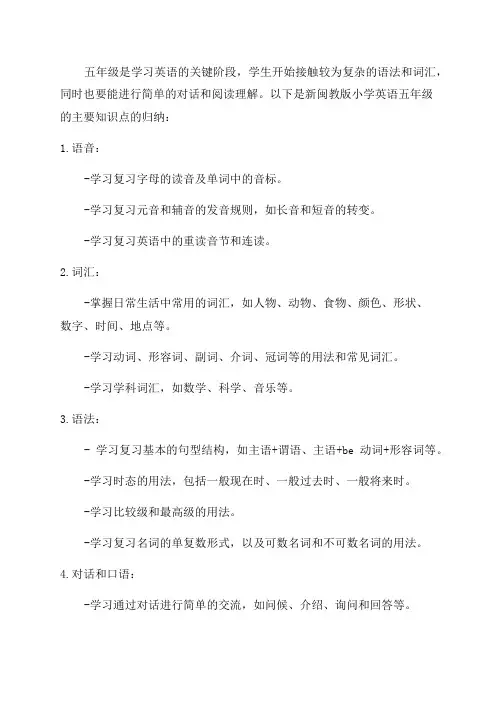
五年级是学习英语的关键阶段,学生开始接触较为复杂的语法和词汇,同时也要能进行简单的对话和阅读理解。
以下是新闽教版小学英语五年级的主要知识点的归纳:1.语音:-学习复习字母的读音及单词中的音标。
-学习复习元音和辅音的发音规则,如长音和短音的转变。
-学习复习英语中的重读音节和连读。
2.词汇:-掌握日常生活中常用的词汇,如人物、动物、食物、颜色、形状、数字、时间、地点等。
-学习动词、形容词、副词、介词、冠词等的用法和常见词汇。
-学习学科词汇,如数学、科学、音乐等。
3.语法:- 学习复习基本的句型结构,如主语+谓语、主语+be动词+形容词等。
-学习时态的用法,包括一般现在时、一般过去时、一般将来时。
-学习比较级和最高级的用法。
-学习复习名词的单复数形式,以及可数名词和不可数名词的用法。
4.对话和口语:-学习通过对话进行简单的交流,如问候、介绍、询问和回答等。
-学习描述日常生活中的活动和事件,如时间、天气、饮食、购物等。
-学习表达自己的感受和意见,以及询问他人的意见和喜好等。
5.阅读理解和写作:-学习阅读简单的短文和故事,并进行理解和回答问题。
-学习书写英文日记、邮件、简单的文章等。
-学习写作短文,包括描述人物、动物、景色等。
6.听力和口语训练:-学习听懂简单的日常用语和指令,并进行应答。
-学习听懂简单的对话和短文,提高听力理解能力。
-学习参与口语交流活动,如角色扮演、分组讨论等。
7.文化和扩展:-学习了解英语国家的文化、风俗和习惯等。
-学习了解英语使用的场合和礼仪等。
-学习欣赏英文歌曲、故事和影视作品等。
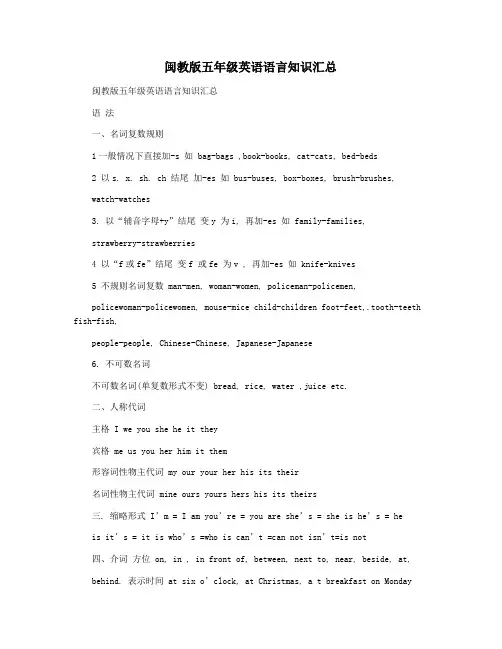
闽教版五年级英语语言知识汇总闽教版五年级英语语言知识汇总语法一、名词复数规则1一般情况下直接加-s 如 bag-bags ,book-books, cat-cats, bed-beds2 以s. x. sh. ch 结尾加-es 如 bus-buses, box-boxes, brush-brushes,watch-watches3. 以“辅音字母+y”结尾变y 为i, 再加-es 如 family-families,strawberry-strawberries4 以“f或fe”结尾变f 或fe 为v , 再加-es 如 knife-knives5 不规则名词复数 man-men, woman-women, policeman-policemen,policewoman-policewomen, mouse-mice child-children foot-feet,.tooth-teeth fish-fish,people-people, Chinese-Chinese, Japanese-Japanese6. 不可数名词不可数名词(单复数形式不变) bread, rice, water ,juice etc.二、人称代词主格 I we you she he it they宾格 me us you her him it them形容词性物主代词 my our your her his its their名词性物主代词 mine ours yours hers his its theirs三. 缩略形式I’m = I am you’re = you are she’s = she is he’s = heis it’s = it is who’s =who is can’t =can not isn’t=is not四、介词方位 on, in , in front of, between, next to, near, beside, at,behind. 表示时间at six o’clock, at Christmas, a t breakfast on M ondayon 15th July On National Dayin the evening in December in winter五、be 动词(1)现在式: I + am ;you 或复数名词如books ,+ are ; he 、she 、it 及单数名词+is现在式的肯定否定句 am(not) are(not) is(not)2、过去式 was(not) were(not) was(not)3、一般疑问句 Am I a Chniese? Yes, you are.Are they American? Yes,六、一般现在时。
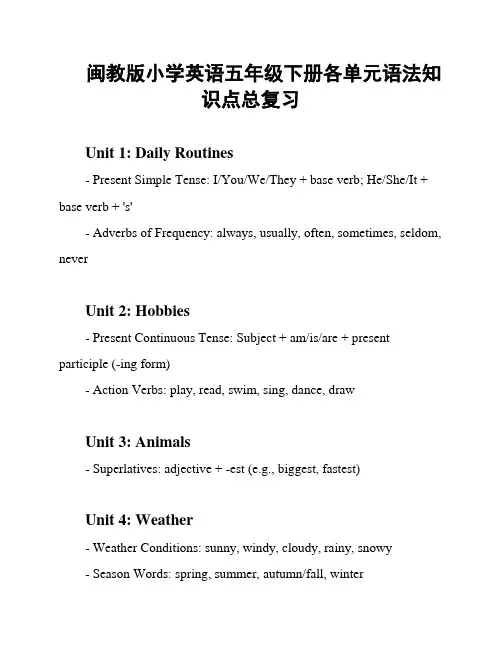
闽教版小学英语五年级下册各单元语法知识点总复习Unit 1: Daily Routines- Present Simple Tense: I/You/We/They + base verb; He/She/It + base verb + 's'- Adverbs of Frequency: always, usually, often, sometimes, seldom, neverUnit 2: Hobbies- Present Continuous Tense: Subject + am/is/are + present participle (-ing form)- Action Verbs: play, read, swim, sing, dance, drawUnit 3: Animals- Superlatives: adjective + -est (e.g., biggest, fastest)Unit 4: Weather- Weather Conditions: sunny, windy, cloudy, rainy, snowy- Season Words: spring, summer, autumn/fall, winterUnit 5: Food and Drinks- Countable and Uncountable Nouns: use 'a/an' with countable nouns and 'some' with uncountable nouns- Quantifiers: a/an, some, a lot of, any, much, manyUnit 6: Places- Prepositions of Place: in, on, under, next to, between- Locative Adverbs: here, thereUnit 7: Festivals- Present Continuous Tense with Future Time: am/is/are + going to + present participle- Celebrations: Christmas, Thanksgiving, Chinese New YearUnit 8: Travel- Past Simple Tense: regular verbs - base verb + 'ed'; irregular verbs - verb changes- Time Expressions: yesterday, last week/month/year, agoUnit 9: Jobs- Job Vocabulary: doctor, teacher, firefighter, police officer, musician, chef- Verb + Infinitive: want to, need to, have to, like toUnit 10: Health- Verb + Object + Infinitive: can, can't, could, couldn't- Expressions for Giving Advice: You should/shouldn't, You ought to, You'd betterUnit 11: Nature- Imperative Sentences: base verb (e.g., Listen! Look! Open!)- Action Verbs: plant, water, pick, feed, take care ofUnit 12: Daily Life- Adjectives to Describe People: tall, short, thin, fat, old, young- Possessive Pronouns: my, your, his, her, its以上为闽教版小学英语五年级下册各单元的语法知识点总复。
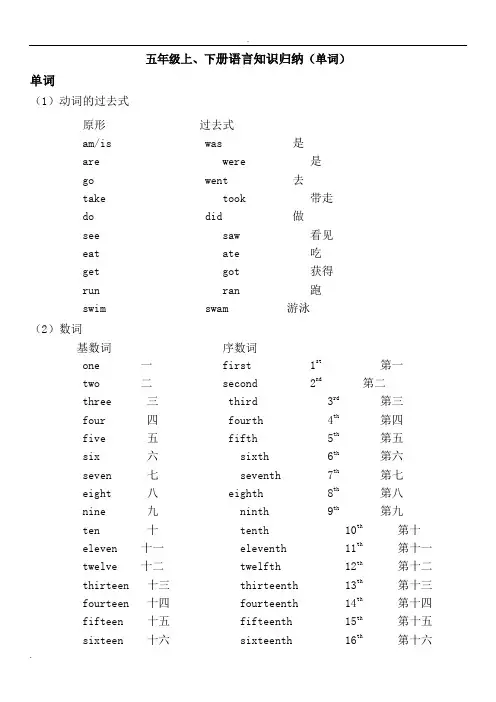
五年级上、下册语言知识归纳(单词)单词(1)动词的过去式原形过去式am/is was 是are were 是go went 去take took 带走do did 做see saw 看见eat ate 吃get got 获得run ran 跑swim swam 游泳(2)数词基数词序数词one 一 first 1st第一two 二 second 2nd第二three 三 third 3rd第三four 四 fourth 4th第四five 五 fifth 5th第五six 六sixth 6th第六seven 七seventh 7th第七eight 八 eighth 8th第八nine 九ninth 9th第九ten 十tenth 10th第十 eleven 十一eleventh 11th第十一 twelve 十二twelfth 12th第十二 thirteen 十三thirteenth 13th第十三 fourteen 十四fourteenth 14th第十四 fifteen 十五fifteenth 15th第十五 sixteen 十六sixteenth 16th第十六seventeen 十七seventeenth 17th第十七 eighteen 十八eighteenth 18th第十八 nineteen 十九nineteenth 19th第十九 twenty 二十twentieth 20th第二十(3)月份January 一月 February 二月 March 三月April 四月 May 五月 June 六月July 七月 August 八月 September 九月October十月 November 十一月 December 十二月(4)表情的形容词proud 自豪的sad 难过的tired 疲倦的 angry 生气的happy 高兴的 hungry 饥饿的lucky 幸运的 thirsty 渴的(5)名词parent 父,母;家长hometown 故乡lake 湖elephant 大象hill 小山map 地图animal 动物garden 花园water 水camera 照相机sky 天空cloud 云floor 楼层bridge 桥date 日期meter 米race 赛跑river 河Mrs. 夫人,太太drawing 画calendar 日历people 人,人们tour 旅行;旅游mountain 山grass 草program 节日building 建筑物neighbor 邻居flower 花paper 纸glasses 眼镜taxi 出租车mobile 手机phone 照片picture 照片,图画classmate 同班同学panda 熊猫pupil 小学生uncle 叔叔,伯伯month 月份man 男人(6)动词color 上颜色hide 藏climb 攀爬try 尝试drink 喝smile 微笑guess 猜cook 烹调shout 喊叫write写(7)形容词tall 高的 short 矮的 long hair 长头发short hair 短头发 young年轻的lovely 可爱的(8)介词In 在…..里面 on在……上面beside 在……旁边Behind 在……后面(9)地点词sitting room 客厅museum 博物馆cinema 电影院train station 火车站 hospital 医院City Library 市图书馆 bus stop 公交车站(10)其他under 在......下面brown 棕色的fast 快busy 忙的only 仅仅also 也difficult 困难的before 在......之前(11)专有名词Sun Moon Lake 日月潭Easter Bunny 复活节兔子Sports Day 运动会China 中国Easter 复活节the Great Wall 长城National Day 国庆节Australia 澳大利亚the USA 美国Teachers’ Day 教师节(12)短语look for 寻找pick up 捡起long jump 跳远high jump 跳高living room 客厅play basketball 打篮球over there 在那边next to 紧挨着get on 上车fall down 跌倒;跌下cheer up 振作起来watch a film 看电影play football 踢足球take a photo 照相draw a picture 画画play chess 下象棋go straight 直着走turn right 向右转turn left 向左转turn on 打开sit down 坐下put on 戴上重点句型1)How was your winter vacation ? 你的寒假过得怎样?It was wonderful. I visited the Great Wall. 太棒了。
闵教版五年级英语上册知识点Unit 1 My School LifeVocabulary•school, grade, classroom, teacher, student, friend, pencil case, eraser, ruler, pencil, notebook, textbook, bag, desk, chair, blackboard, chalk, whiteboard, marker, window, door, floor, ceilingGrammar•be verbs (am, is, are)•possessive adjectives (my, your, his, her, its, our, their)•present continuous tense: am/is/are + verb+ing•Yes/No questions with be verbs (Am I…? Is he…?, Are they…?)•Short answers with be verbs (yes, I am/yes, he is/yes, they are/ no, I’m not/no, he’s not/ no, they’re not)Sentences•I am in Grade 5.•This is my classroom.•My teacher is Ms. Li.•My friends are Jack and Lucy.•I have a pencil case with a ruler and an eraser.•I have a pencil and a notebook in my bag.•The desk is in front of the chair.•The blackboard is behind the teacher.•The marker is on the whiteboard.•The window is open.•The door is closed.•The floor is clean.•The ceiling is high.•Am I in Grade 5?•Is he my teacher?•Are they my friends?•Yes, I am.Unit 2 My Family and My HomeVocabulary•family, father, mother, brother, sister, grandpa, grandma, aunt, uncle, cousin, house, living room, bedroom, bathroom, kitchen, dining room, sofa, TV, table, chair, bed, pillow, blanket, closet, drawer, mirror, sink, toilet, shower, bathtub, stove, fridge, microwave, kettle, dish, cup, spoon, fork, knife Grammar•be verbs in present and past tense (am, is, are, was, were)•personal pronouns (I, you, he, she, it, we, they)•possessive s (my father’s, my mother’s, his sister’s, their house’s, etc.)•prepositions of place (on, under, in, behind, in front of, next to, etc.) •simple past tense (regular verbs ending in -ed, irregular verbs) Sentences•My family is big.•My father is tall.•My mother is beautiful.•My brother is cute.•My sister is helpful.•My grandpa is kind.•My grandma is funny.•My aunt is lovely.•My uncle is cool.•My cousins are smart.•The living room is comfortable.•The bedroom is cozy.•The bathroom is clean.•The kitchen is busy.•The dining room is spacious.•The sofa is soft.•The TV is big.•The table is round.•The chair is wooden.•The bed is comfortable.•The pillow is fluffy.•The blanket is warm.•The closet is spacious.•The drawer is deep.•The mirror is clean.•The sink is shiny.•The toilet is white.•The shower is hot.•The bathtub is big.•The stove is hot.•The fridge is cold.•The microwave is fast.•The kettle is noisy.•The dish is delicious.•The cup is full.•The spoon is big.•The fork is sharp.•The knife is dangerous.•My father’s name is Peter.•Her sister’s name is Linda.•Our house is old.•The TV is on the table.•The sofa is next to the table.•The bed is under the window.•The pillow is on the bed.•The blanket is in the closet.•The mirror is above the sink.•The toilet is behind the door.•The shower is in the bathroom.•I brushed my teeth.•He watched a movie.•They played games.Unit 3 My Body and My ClothesVocabulary•body, head, hair, ear, eye, nose, mouth, tooth, tongue, face, neck, hand, arm, elbow, shoulder, chest, stomach, leg, knee, foot, ankle, toe, clothes, shirt, T-shirt, jacket, coat, sweater, skirt, dress, pants, shorts, socks, shoes, boots Grammar•have and has•present continuous tense with body parts and clothes•subject-verb agreement (I have, she has)•can/can’tSentences•I have two eyes and one nose.•She has long hair and a beautiful smile.•He has big ears and a small mouth.•We have ten fingers and two hands.•They have four legs and two feet.•My shirt is blue.•His T-shirt is red.•Her jacket is green.•Our coats are warm.•Their sweaters are cozy.•My skirt is short.•Her dress is pretty.•His pants are new.•Their shorts are cool.•My socks are white.•His shoes are black.•Her boots are brown.•I am wearing a T-shirt and pants.•She is wearing a skirt and a blouse.•He is wearing a shirt and shorts.•We are wearing jackets and jeans.•They are wearing coats and boots.•I can swim.•She can dance.•He can play basketball.•We can sing.•They can draw.•I can’t fly.•She can’t ride a bike.•He can’t cook.•We can’t speak French.•They can’t play the piano.Unit 4 My HobbiesVocabulary•hobbies, read, draw, play, swim, dance, sing, run, walk, bike, play basketball, play soccer, play volleyball, play tennis, collect, stamp, coin, postcard, toy, model, watch, movie, listen, music•like and likes•verb + object (I like to read books)•can/can’tSentences•My hobby is reading.•Her hobby is drawing.•His hobby is playing basketball.•Our hobby is swimming.•Their hobby is playing soccer.•I like to read books.•She likes to draw pictures.•He likes to play basketball with friends.•We like to swim in the pool.•They like to play soccer on the field.•I can run fast.•She can dance well.•He can swim in the sea.•We can ride bikes in the park.•They can play soccer with skill.•I can’t sing well.•She can’t play the guitar.•He can’t draw cartoons.•We can’t dance ballet.•They can’t swim in the lake.Unit 5 My CityVocabulary•city, town, village, country, road, street, avenue, lane, block, building, house, apartment, store, shop, market, supermarket, bank, hospital, school, park, library, museum, theatre, cinema, restaurant, hotel, airport, train station, bus stop, subway, taxi, car, bike, busGrammar•have and has•there is/there are•prepositions of place (in, on, at, near, between, etc.)•can/can’t•I live in Shanghai.•Shanghai is a big city in China.•There are many tall buildings and wide roads in Shanghai.•There is a big park and a small library near my home.•There are many shops and restaurants on this street.•The supermarket is between the bank and the post office.•The hospital is next to the school.•The cinema is across from the theatre.•The museum is behind the library.•The train station is far from my home.•The airport is big and busy.•The bus stop is in front of the supermarket.•I ride my bike to school every day.•She takes the subway to work in the morning.•He drives his car to the park on weekends.•We take the bus to the market on Sundays.•They call a taxi when it rains.Unit 6 My Food and My DrinkVocabulary•food, drink, breakfast, lunch, dinner, fruit, apple, banana, orange, strawberry, watermelon, kiwi, grape, mango, pear, tomato, carrot, onion, potato, corn, broccoli, chicken, beef, pork, fish, shrimp, noodles, rice, bread, cheese, milk, juice, coffee, tea, water, cokeGrammar•like and likes•there is/there are•countable and uncountable nouns (one apple, two glasses of water)•can/can’tSentences•I like apples and oranges.•She likes bananas and kiwis.•He likes grapes and mangoes.•We like strawberries and watermelons.•They like pears and tomatoes.•There is an apple on the table.•There are two bananas in the basket.•There is a tomato in the sandwich.•There are broccoli and carrots in the soup. •I have one glass of milk for breakfast. •She has two slices of bread for lunch. •He has three bowls of noodles for dinner. •We have four pieces of cheese on the pizza. •They have five cups of coffee at work.•I can cook chicken and beef.•She can make pork and fish dishes.•He can fry eggs and shrimp.•We can cook noodles and rice.•They can make sandwiches and salads.•I can’t eat spicy food.•She can’t drink coffee.•He can’t eat seafood.•We can’t drink alcohol.•They can’t eat fast food.。
闽教版小学英语五年级下册知识点Unit 1 重点句型与语法How was your winter vacation?你的寒假过得如何?It was wonderful. I visited the Great Wall.好极了,我参观了长城。
was 是 is 的过去式。
动词的过去式分规则和不规则动词规则动词一般在动词原形末尾直接加上 -ed 。
如: look-- looked, visit--visited, watch--watched以不发音的字母 e 结尾的动词 ,只需加 -d。
如: live--lived 。
末尾只有一个辅音字母的重读闭音节,先双写这个辅音字母,再加 -ed 。
如: stop--stopped 。
末尾是辅音字母 +y 结尾的动词 ,先改 y 为 i,然后再加上 -ed。
如: study--studied 。
How about you ? Were you in China?你呢?你在中国吗?No, I wasn’t. I went to Australia.不,我不在中国。
我去了澳大利亚。
How was the weather there?那里的天气如何?It was hot. It was summer there.那里天气很热,是夏天。
I went to Taiwan with my parents.我和父母一起去了台湾。
with 介词 ,意思是和 ,跟,随着Is it your hometown?台湾是你的故乡吗?1 / 8Yes, it is.是的,是我的故。
it指代前面提的台湾。
I took a boat tour of Sun Moon Lake.我乘船游了日月潭。
Unit2重点句型与法Look, there is a map over there.瞧那有一幅地。
there be 句型表示的是“某有(存在)某人或某物”,其构There be +名 +地点状(地点状也可以放在句首)。
五年级上、下册语言知识归纳(单词)单词(1)动词的过去式原形过去式am/is was 是are were 是go went 去take took 带走do did 做see saw 看见eat ate 吃get got 获得run ran 跑swim swam 游泳(2)数词基数词序数词one 一 first 1st第一two 二 second 2nd第二 three 三 third 3rd第三four 四 fourth 4th第四five 五 fifth 5th第五six 六sixth 6th第六seven 七seventh 7th第七eight 八 eighth 8th第八nine 九ninth 9th第九ten 十tenth 10th 第十eleven 十一eleventh 11th 第十一twelve 十二twelfth 12th 第十二thirteen 十三thirteenth 13th 第十三fourteen 十四fourteenth 14th 第十四fifteen 十五fifteenth 15th 第十五sixteen 十六sixteenth 16th 第十六seventeen 十七seventeenth 17th 第十七eighteen 十八eighteenth 18th 第十八nineteen 十九nineteenth 19th 第十九twenty 二十twentieth 20th 第二十(3)月份January 一月 February 二月 March 三月April 四月 May 五月 June 六月July 七月 August 八月 September 九月October十月 November 十一月 December 十二月(4)表情的形容词proud 自豪的sad 难过的tired 疲倦的 angry 生气的happy 高兴的 hungry 饥饿的lucky 幸运的 thirsty 渴的(5)名词parent 父,母;家长hometown 故乡lake 湖elephant 大象hill 小山map 地图animal 动物garden 花园water 水camera 照相机sky 天空cloud 云floor 楼层bridge 桥date 日期meter 米race 赛跑river 河Mrs. 夫人,太太drawing 画calendar 日历people 人,人们tour 旅行;旅游mountain 山grass 草program 节日building 建筑物neighbor 邻居flower 花paper 纸glasses 眼镜taxi 出租车mobile 手机phone 照片picture 照片,图画classmate 同班同学panda 熊猫pupil 小学生uncle 叔叔,伯伯month 月份man 男人(6)动词color 上颜色hide 藏climb 攀爬try 尝试drink 喝smile 微笑guess 猜cook 烹调shout 喊叫write写(7)形容词tall 高的 short 矮的 long hair 长头发short hair 短头发 young年轻的lovely 可爱的(8)介词In 在…..里面 on在……上面beside 在……旁边Behind 在……后面(9)地点词sitting room 客厅museum 博物馆cinema 电影院train station 火车站 hospital 医院City Library 市图书馆 bus stop 公交车站(10)其他under 在......下面brown 棕色的fast 快busy 忙的only 仅仅also 也difficult 困难的before 在......之前(11)专有名词Sun Moon Lake 日月潭Easter Bunny 复活节兔子Sports Day 运动会China 中国Easter 复活节the Great Wall 长城National Day 国庆节Australia 澳大利亚the USA 美国Teachers’ Day 教师节(12)短语look for 寻找pick up 捡起long jump 跳远high jump 跳高living room 客厅play basketball 打篮球over there 在那边next to 紧挨着get on 上车fall down 跌倒;跌下cheer up 振作起来watch a film 看电影play football 踢足球take a photo 照相draw a picture 画画play chess 下象棋go straight 直着走turn right 向右转turn left 向左转turn on 打开sit down 坐下put on 戴上重点句型1)How was your winter vacation ? 你的寒假过得怎样?It was wonderful. I visited the Great Wall. 太棒了。
我参观了长城。
2) I went to Australia. 我去了澳大利亚。
3) I visited the museum. 我参观了博物馆。
4) I watched TV. 我看了电视。
5) I went to Taiwan with my parents. 我和父母亲去了台湾。
6) I took a boat tour of Sun Moon Lake. 我坐邮轮逛了日月潭。
7)There is a map over there. 那儿有张地图。
8)There are some bears under the tree. 在树下有一些熊。
9) I took a photo of a baby elephant. 我拍了一张小象宝宝的照片。
10) What animals did you see ? 你看到了什么动物?We saw tigers. 我们看到了老虎。
11)Did you give food to the monkeys ? 你们有喂猴子食物吗?No, we didn’t. 不,我们没有。
12) I’m going to color the eggs. 我打算给蛋涂色。
13) I’m going to hide the eggs. 我打算把蛋藏起来。
14) She is going to do her homework. 她准备做家庭作业。
15) They are going to skate. 他们打算去滑冰。
16) They are going to look for the eggs. 他们打算去找蛋。
17) They are looking for the eggs. 他们正在找蛋。
18) She is hiding the Easer eggs. 她正在藏复活节彩蛋。
19) We are going for a spring outing. 我们准备外出春游。
20) What are you going to take with you ? 你打算随身携带什么?I’m going to take some water with me. 我打算带些水。
21) They are going to get on the bus. 他们准备上车。
22) They are getting on the bus. 他们正在上车。
23) Miss Gao is going to take a photo. 高老师打算拍张照片。
24) She is taking a photo of her pupils. 她正在拍张她学生的照片。
25) We are going to have a Sports Day. 我们打算开场运动会。
26) Who will do long jump ? 谁打算参加跳远?Julia will. 朱丽叶。
27) Peter is running 100 meters. 彼得正在跑100米。
28) Yang Ming is falling down. 杨明摔倒了。
29) Li Hua is the third. 李华第三名。
30) We’re proud of you. 我们因你而骄傲。
31) I didn’t do well in high jump. 我跳高跳得不好。
32) Which floor do you live on ? 你住在几楼?On the twelfth floor. 在十二楼。
33) Which floor does he live on ? 他住在几楼?On the fifteenth floor. 在十五楼。
34) What’s the date today ? 今天是几号?It’s April 23. 四月23日。
35) January 1 is New Year’s Day. 一月一日是元旦。
36) June 1 is Children’s Day. 六月一日是儿童节。
37) September 10 is Teachers’ Day. 九月十日是教师节。
38) December 25 is Christmas Day. 十二月二十五日是圣诞节。
39)Who’s that boy ? 那个男孩是谁?40)Which boy ? 哪个男孩?41) The boy beside Wang Tao. 那个在王涛旁边的男孩。
42)The girl behind Sally. 那个在萨莉后面的女孩。
43) The girl with an umbrella. 拿着雨伞的女孩。
44) What’s he/she/they doing ? 他/她/他们在做什么?45) He’s drawing a panda. 他在画熊猫。
46) They’re reading a book. 他们在读书。
47) They’re making flowers. 他们在做花。
48) Will you go to Wuyishan ? Yes, I will. 你将去武夷山吗?是的,我将去。
49) Will you go by train ? Yes, I will.. 你将做火车去吗?是的,我将。
50) How is the weather in autumn ? 秋天天气怎么样?51) It’s very hot in July and August.七月和八月很热。
52) It’s Sunday today. 今天是星期天。
Can we go to the cinema ? Yes. Let’s go. 我们能不能去电影院?好的,走吧。